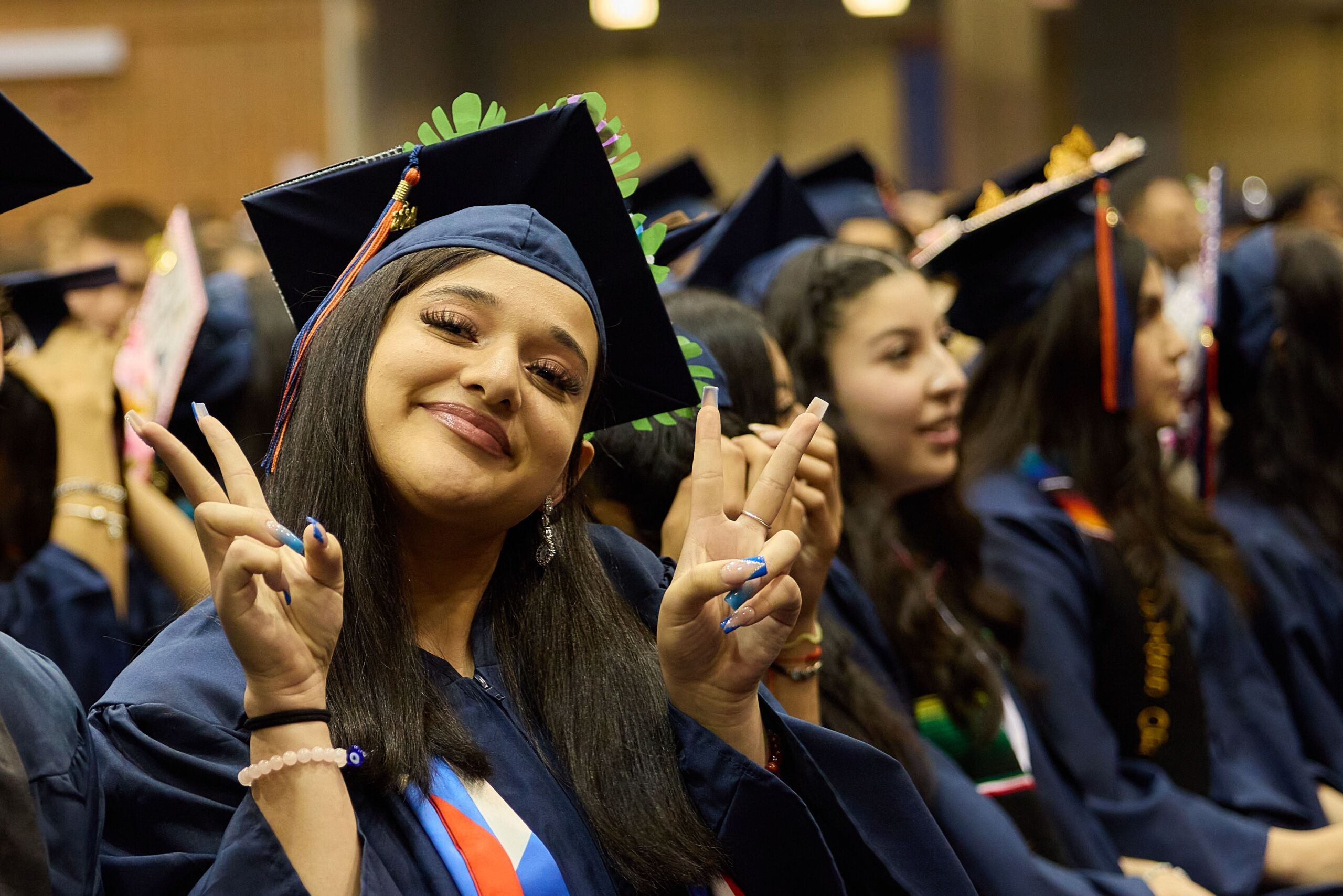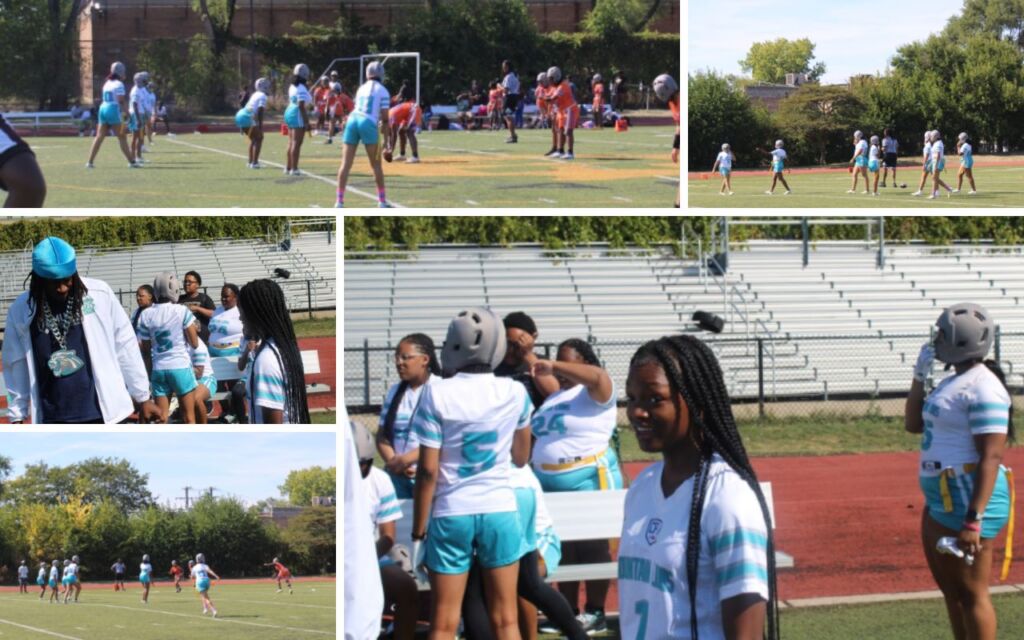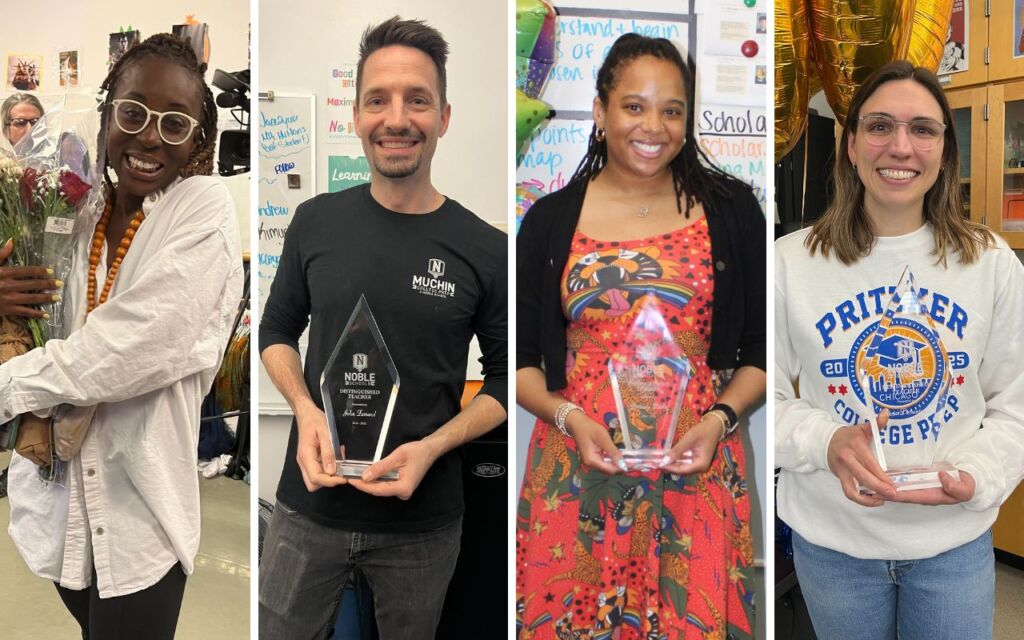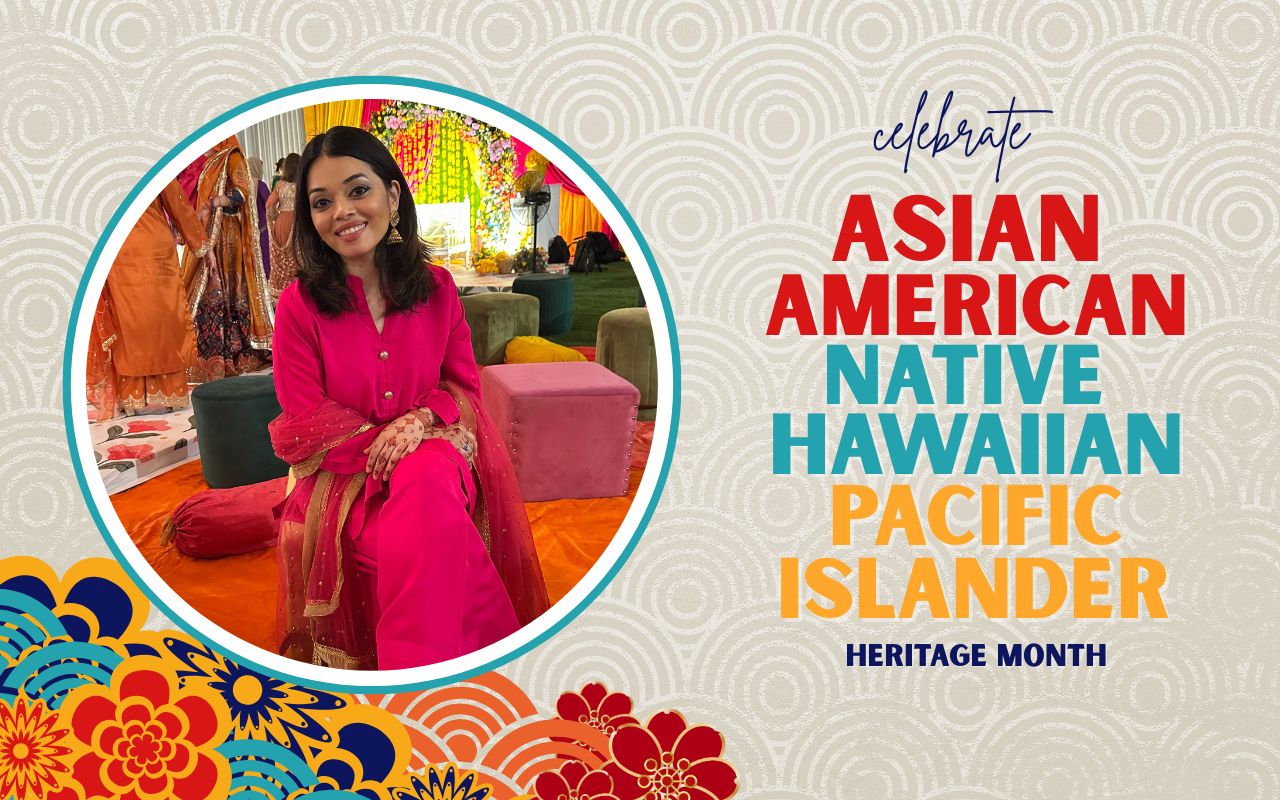
This is part of a series of writings from Noble staff that celebrate heritage and history. This piece was written to celebrate Asian American, Native Hawaiian, and Pacific Islander Heritage Month in 2025.
By Afsha Wasi | she/her
U.S. History Teacher, Noble Street College Prep
It’s the first day of seventh grade, and I’m sitting in my English class. The teacher calls my name for attendance.
“OFF-SHAW… is it AH-FA-SHA? Sorry, is it UP-SHAW?”
As she struggles to pronounce my name, I hear snickering from my classmates, especially from one student, let’s call him Greg. Before she can go any further and for which I can only bare, I raise my hand and interrupted her.
“Ms. Stark, it’s Afsha. Pronounced ‘Uff-shaw.’”
“Oh, sorry, OFF-Shaw,” she responds.
When class ends and as I walk towards the door to exit the class, Greg “accidentally” bumps into me.
“Oops, sorry, Oopshoo,” he mocks, and his friends burst into laughter.
Just like that, I became the laughingstock of my seventh-grade class all year long because my English teacher couldn’t pronounce my name correctly, and Greg took the opportunity to turn it into a joke. I was deeply bothered by it. But I was also a shy student, the type who never spoke up. Looking back now, I wish I had stood up for myself especially for my mother.
You see, Afsha, in Urdu, a language spoken in Pakistan and India, means “one who sprinkles light.” My mother gave me this name. As a teenager, she watched a Pakistani soap opera featuring a character named Afsha and fell in love with the name. She was so committed that if she ever had a daughter, she would name her Afsha.
My mother was born in East Pakistan, which is now Bangladesh. She endured many hardships due to the constant migration and upheaval caused by the partition of India forming into Pakistan, a result of British colonization. She was separated from her family and watched her father get arrested for being Muslim and placed in refugee camps throughout South Asia. Eventually, her family settled in the newly established Pakistan.
Years later, when my mother moved to America after marriage, she faced countless challenges because of her identity. She had to adapt to a new culture and quickly learn a new language. She wasn’t given much in life, nor many opportunities to make decisions for herself. But the one thing she did have control over was naming her daughter a decision she took immense pride in. She chose a Pakistani name, a name she cherished. A name butchered by a white classmate.
This is a story I share with my students every year on the first day of school at Noble Street. I wanted them to know who I am and understand why identity matters. I also wanted them to see the challenges I faced growing up as a minority in America attending a school where no one looked like me. Though I was born in the U.S., I didn’t speak English. My mother only spoke to us in Urdu, so I was placed in ESL classes throughout elementary and middle school years. She was adamant about preserving our language, ensuring that we spoke Urdu at home and with our Pakistani friends. The cuisines we ate as children go back to our Pakistani roots. She made sure we wore cultural attire, shalwar kameez, whenever we had the chance.
When I share this story with my students, a few of them resonate with my story. They share how they, too, struggled with English because their families only spoke their native language at home.
I still remember my first interview at Noble Street four years ago. The very first question Principal Gunty asked was how to correctly pronounce my name before even attempting to say it. I was so grateful that he took the time to show respect in such a simple yet meaningful way. Once I was hired, the first book I received at Noble was Cultivating Genius by Gholdy Muhammad. In it, she discusses why identity matters: ” Identity was one of the first things stripped from enslaved Africans.” A significant part of the book emphasizes reclaiming our identities as Black and Brown individuals, and it starts with understanding the history and meaning of our names. Not to mention how important it is for us to know about cultures as a way for us to “respect, love and live in harmony”. I had never related to a text more deeply. It validated what I already believed as an educator.
At Noble, we serve students from beautifully diverse backgrounds. That’s why, in my U.S. History class, I make sure we take the time to explore the meaning of our names while also studying the history of our individual past. This is what makes teaching beautiful.
My mother instilled in me the values of being South Asian, values I now hope to pass down to my son, Hasan. A name I chose, just as my mother did for me. A name that means “beautiful prince”, and named after someone I deeply admire.
I am the proud daughter of an immigrant from Pakistan. My mother is one of the strongest, most resilient women I will ever know in my life. I take pride in my name and my Pakistani identity. And this is what this month means to me.
Por Afsha Wasi | she/her/ella
U.S. History Teacher, Noble Street College Prep
Es el primer día de séptimo curso y estoy sentado en clase de inglés. La profesora pasa lista.
«OFF-SHAW… ¿es AH-FA-SHA? Perdona, ¿es UP-SHAW?».
Mientras ella se esfuerza por pronunciar mi nombre, oigo risitas entre mis compañeros, especialmente de uno de ellos, llamémosle Greg. Antes de que pueda continuar y de que yo pueda soportarlo más, levanto la mano y la interrumpo.
«Señora Stark, es Afsha. Se pronuncia «Uff-shaw»».
«Oh, lo siento, OFF-Shaw», responde ella.
Cuando termina la clase y me dirijo hacia la puerta para salir, Greg «accidentalmente» choca conmigo.
«Ups, lo siento, Oopshoo», se burla, y sus amigos se echan a reír.
Así, sin más, me convertí en el hazmerreír de mi clase de séptimo curso durante todo el año porque mi profesora de inglés no sabía pronunciar mi nombre correctamente y Greg aprovechó la oportunidad para convertirlo en una broma. Me molestó mucho. Pero yo era una estudiante tímida, de las que nunca dicen nada. Ahora, mirando atrás, ojalá hubiera defendido mi nombre, sobre todo por mi madre.
Verás, Afsha, en urdu, un idioma que se habla en Pakistán y la India, significa «la que esparce la luz». Mi madre me puso este nombre. Cuando era adolescente, vio una telenovela pakistaní en la que aparecía un personaje llamado Afsha y se enamoró del nombre. Estaba tan convencida de que, si alguna vez tenía una hija, la llamaría Afsha.
Mi madre nació en Pakistán Oriental, que ahora es Bangladesh. Sufrió muchas penurias debido a las constantes migraciones y los disturbios causados por la partición de la India y la formación de Pakistán, como resultado de la colonización británica. Se separó de su familia y vio cómo arrestaban a su padre por ser musulmán y lo internaban en campos de refugiados en todo el sur de Asia. Finalmente, su familia se estableció en el recién creado Pakistán.
Años más tarde, cuando mi madre se mudó a Estados Unidos después de casarse, se enfrentó a innumerables retos debido a su identidad. Tuvo que adaptarse a una nueva cultura y aprender rápidamente un nuevo idioma. No le dieron mucho en la vida, ni muchas oportunidades para tomar decisiones por sí misma. Pero lo único sobre lo que tenía control era el nombre de su hija, una decisión de la que se sentía muy orgullosa. Eligió un nombre pakistaní, un nombre que apreciaba mucho. Un nombre que un compañero de clase blanco destrozó.
Esta es una historia que comparto con mis alumnos cada año el primer día de clase en Noble Street. Quería que supieran quién soy y que entendieran por qué la identidad es importante. También quería que vieran los retos a los que me enfrenté al crecer como minoría en Estados Unidos, asistiendo a una escuela donde nadie se parecía a mí. Aunque nací en Estados Unidos, no hablaba inglés. Mi madre solo nos hablaba en urdu, así que me pusieron en clases de inglés como segunda lengua durante toda la primaria y la secundaria. Ella se empeñó en preservar nuestra lengua y se aseguraba de que habláramos urdu en casa y con nuestros amigos pakistaníes. La comida que comíamos de niños se remonta a nuestras raíces pakistaníes. Se aseguraba de que lleváramos ropa tradicional, shalwar kameez, siempre que podíamos.
Cuando cuento esta historia a mis alumnos, algunos se identifican con ella. Me cuentan que ellos también tuvieron dificultades con el inglés porque sus familias solo hablaban su lengua materna en casa.
Todavía recuerdo mi primera entrevista en Noble Street hace cuatro años. La primera pregunta que me hizo el director Gunty fue cómo se pronunciaba correctamente mi nombre, antes incluso de intentar pronunciarlo. Le agradecí mucho que se tomara el tiempo de mostrarme respeto de una manera tan sencilla pero significativa. Una vez contratada, el primer libro que recibí en Noble fue Cultivating Genius, de Gholdy Muhammad. En él, la autora analiza por qué la identidad es importante: «La identidad fue una de las primeras cosas que se les arrebató a los africanos esclavizados». Una parte importante del libro hace hincapié en la recuperación de nuestra identidad como personas negras y morenas, y comienza por comprender la historia y el significado de nuestros nombres. Por no hablar de lo importante que es para nosotros conocer las culturas como forma de «respetar, amar y vivir en armonía». Nunca me había sentido tan identificada con un texto. Reafirmaba lo que ya creía como educadora.
En Noble, atendemos a estudiantes de orígenes maravillosamente diversos. Por eso, en mi clase de Historia de los Estados Unidos, me aseguro de que dediquemos tiempo a explorar el significado de nuestros nombres, al tiempo que estudiamos la historia de nuestro pasado individual. Esto es lo que hace que la enseñanza sea hermosa.
Mi madre me inculcó los valores de ser sudasiática, valores que ahora espero transmitir a mi hijo, Hasan. Un nombre que elegí, igual que mi madre hizo conmigo. Un nombre que significa «príncipe hermoso» y que lleva el nombre de alguien a quien admiro profundamente.
Soy la orgullosa hija de una inmigrante de Pakistán. Mi madre es una de las mujeres más fuertes y resilientes que he conocido en mi vida. Me enorgullece mi nombre y mi identidad pakistaní. Y eso es lo que significa este mes para mí.
By Afsha Wasi | she/her
U.S. History Teacher, Noble Street College Prep
这是初一的第一天,我正坐在英语课上。老师点名点到我的名字。
“OFF-SHAW……是AH-FA-SHA吗?对不起,是UP-SHAW吗?”
当她努力发音时,我听到同学们窃笑,尤其是其中一个叫格雷格的学生。在她继续之前,我实在忍无可忍,举手打断了她。
“斯塔克老师,是阿夫莎。发音是’乌夫-肖’。”
“哦,对不起,是’OFF-Shaw’,”她回应道。
下课后,当我走向门口准备离开教室时,格雷格“不小心”撞到了我。
“哦,对不起,乌普肖,”他嘲讽道,他的朋友们顿时爆发出笑声。
就這樣,我成了七年級全班一整年的笑柄,只因我的英語老師無法正確發音我的名字,而格雷格趁機將它變成笑話。這件事讓我深感困擾。但我當時是個害羞的學生,從不敢發聲。回想起來,我真希望當時能為自己發聲,尤其是為了我的母親。
你知道吗,阿夫莎,在乌尔都语中,阿夫莎意味着“洒下光明的人”。我母亲给我取了这个名字。她年轻时看过一部巴基斯坦肥皂剧,剧中有个角色叫阿夫莎,她对这个名字一见钟情。她决心如果将来有女儿,一定要取这个名字。
我的母亲出生在东巴基斯坦,即现在的孟加拉国。由于印度分治形成巴基斯坦的殖民统治,她经历了无数艰辛。她与家人分离,目睹父亲因穆斯林身份被捕,被关押在南亚各地的难民营。最终,她的家人定居在刚成立的巴基斯坦。
多年后,母亲结婚后移居美国,因身份问题面临无数挑战。她必须适应新文化并迅速学习新语言。生活中她并未获得太多资源,也鲜有自主决策的机会。但她唯一能掌控的,便是为女儿取名——这是她引以为傲的决定。她选择了一个巴基斯坦名字,一个她深爱的名字。一个被白人同学篡改的名字。
这是我每年在诺布尔街学校开学第一天与学生们分享的故事。我希望他们了解我是谁,明白身份为何重要。我也想让他们看到,作为美国少数族裔,在没有同龄人相似的学校成长所面临的挑战。尽管我出生在美国,但不会说英语。我的母亲只用乌尔都语与我们交流,因此我在小学和初中阶段都被安排进了英语作为第二语言的课程。她坚持要保留我们的语言,确保我们在家庭和与巴基斯坦朋友相处时都使用乌尔都语。我们童年时吃的食物都源自巴基斯坦的传统。她还确保我们在有机会时穿上传统服饰,如沙丽和卡米兹。
当我与学生分享这段经历时,有几位学生感同身受。他们也讲述了自己因家庭只说母语而英语学习困难的经历。
我至今仍记得四年前在诺布尔街学校的第一次面试。校长冈蒂在尝试发音前,首先询问了我名字的正确发音。我非常感激他以如此简单却充满尊重的方式表达敬意。被录用后,我在诺布尔学校收到的第一本书是戈尔迪·穆罕默德所著的《培养天才》。书中探讨了“身份为何重要”: “身份是奴隶制下被剥夺的第一件事。“书中很大篇幅强调了黑人和棕色人种重新找回身份的重要性,而这一切都始于理解我们名字的历史与意义。更不用说了解文化对我们”尊重、爱护并和谐共处”的重要性。我从未对一本书产生过如此深刻的共鸣。它验证了我作为教育工作者一直坚信的理念。
在诺布尔学校,我们服务于背景多元化的学生。因此,在我的美国历史课上,我确保我们花时间探索名字的意义,同时研究我们个人过去的历史。这就是教学的美妙之处。
我的母亲灌输给我作为南亚人的价值观,这些价值观是我现在希望传给我的儿子哈桑的。这个名字是我自己选择的,就像我母亲为我选择的那样。这个名字意味着“美丽的王子”,是以我深深敬佩的人命名的。
我是巴基斯坦移民的骄傲女儿。我的母亲是我一生中遇到的最坚强、最坚韧的女性之一。我为我的名字和巴基斯坦身份感到自豪。这就是这个月对我意味着什么。

